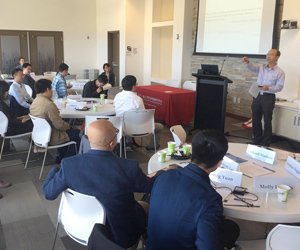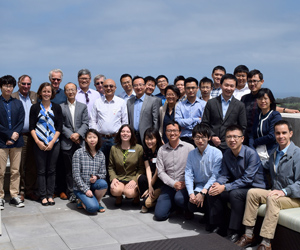This year’s conference, themed “Social Sciences and China Studies,” gathered Chinese social science experts from institutions across China and the U.S. to present their current research and share and exchange ideas.
For the first time, the center expanded the conference’s participation to include Ph.D. students and young professors outside of Fudan University and the University of California (UC) system. Such students represented the University of Pennsylvania, Yale University, Tsinghua University, Hong Kong University of Science and Technology and Columbia University.
Headquartered at UC San Diego’s School of Global Policy and Strategy (GPS), the center privileges the chance to host Chinese scholars in the U.S. and has given UC faculty the opportunity to attend conferences in China, including at the Shanghai Forum at Fudan University from May 28-30.
“It’s been a very fruitful exchange,” Fudan-UC Center Director Richard Madsen said. He described the Young Scholars Conference as one of the “happiest events” of which the center has been involved. Out of 85 applications, a selection committee picked 14 to be presented at this year’s conference. “It was a difficult selection, but I think we have the best gathered here,” Madsen said. “You all are the new generation (of academic leaders), and we want to cultivate and facilitate your growth.”
Lei Guang, director of the 21st Century China Program at GPS echoed this sentiment. “We’ve been able to assemble a great group of scholars. You should congratulate yourselves,” Guang said. “Fudan is doing something unique and generous, investing in the public good by engaging and encouraging young scholars.”
Fudan-UC Center Managing Associate Director Xian Xu also welcomed the conference visitors, describing how the Fudan-UC Center was established to play a vital role in Fudan University’s international outreach and in China-U.S. engagement. He encouraged everyone to stay involved both through the center and through other Fudan-sponsored events, including the upcoming Shanghai Forum to be held at Fudan University’s main campus.
Throughout the course of two days, the 14 up-and-coming China studies scholars presented their research and received feedback from their peers and professors.
 Their work pushed the edges of social science, from mapping the spectrum of liberal-conservative political preferences within Chinese society to calculating the number of interactions with state-owned news sources on social media and analyzing cultural factors that could explain political trust. Some research, such as a study of urban Chinese volunteers through interviews, was very rooted in the context of China. Others, like using Gaussian kernels and network analysis to model political relationships, could be utilized in understanding the world as a whole.
Their work pushed the edges of social science, from mapping the spectrum of liberal-conservative political preferences within Chinese society to calculating the number of interactions with state-owned news sources on social media and analyzing cultural factors that could explain political trust. Some research, such as a study of urban Chinese volunteers through interviews, was very rooted in the context of China. Others, like using Gaussian kernels and network analysis to model political relationships, could be utilized in understanding the world as a whole.
“China studies is entering a new phase,” Guang said. “Data is allowing China studies to be a part of the greater social science field rather than be confined to area studies where it had been isolated before.”
GPS professors including Barry Naughton, Victor Shih, Ruixue Jia and Stephen Haggard, as well as 21st Century China Program affiliate Molly Roberts, gave detailed feedback, commending the new ideas explored, suggesting new ways to approach research questions and recommending resources. Students welcomed the feedback and discussed how they would use the comments to improve their research in the future. After the faculty comments, the floor opened up for conversation and feedback from the scholars themselves. Coming from various fields and focuses, the scholars were able to view their peers’ research with fresh eyes.
Discussions carried on well into the evening, when the group convened for dinner Friday night, and continued on to the second day of the conference. After the final presentations concluded, attendees took a well-earned moment to enjoy the San Diego sunshine.
View photos from the conference. In a San Diego conference room with a view over the Pacific Ocean, students and professors met for the Fudan-UC Center on Contemporary China’s third annual
In a San Diego conference room with a view over the Pacific Ocean, students and professors met for the Fudan-UC Center on Contemporary China’s third annual